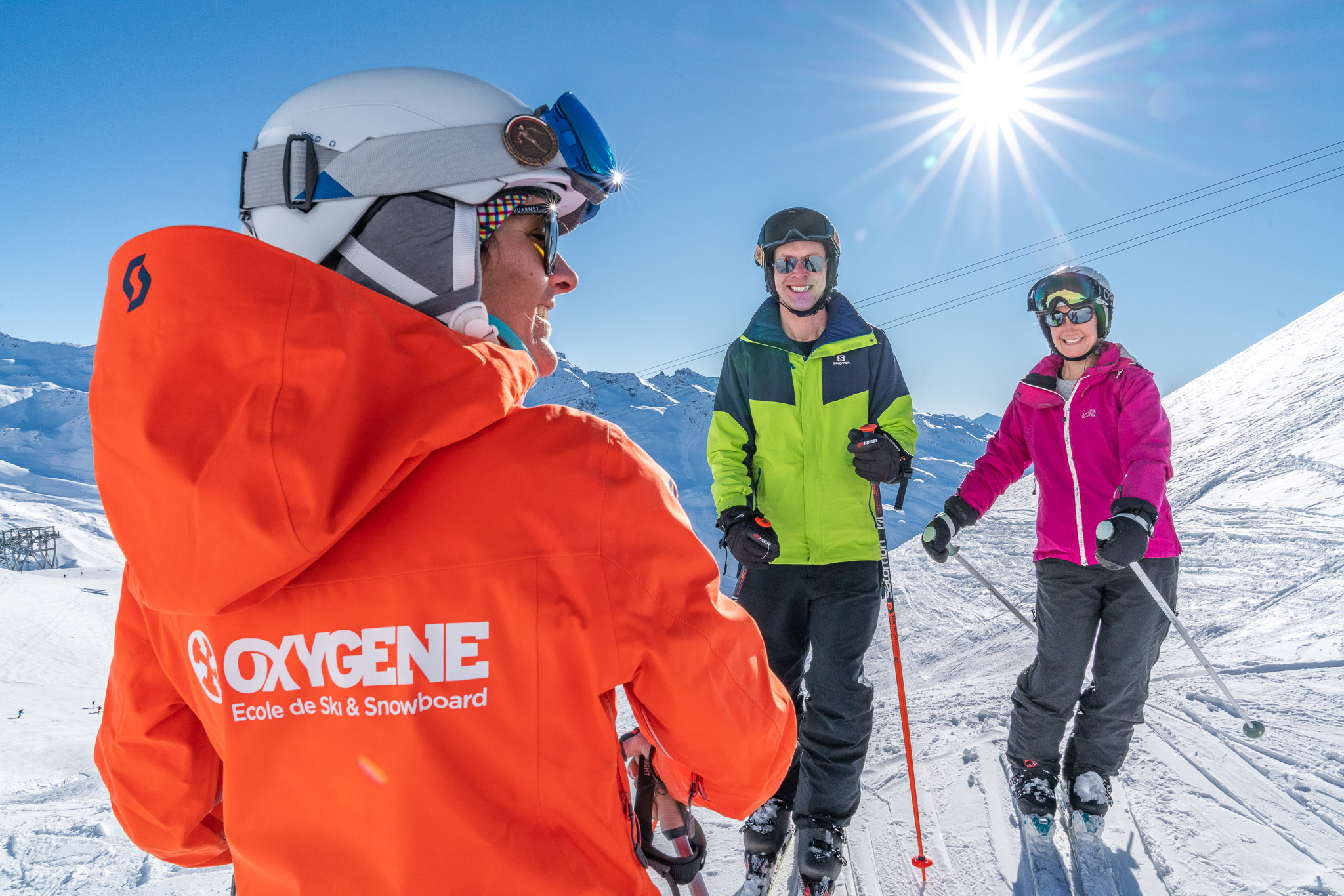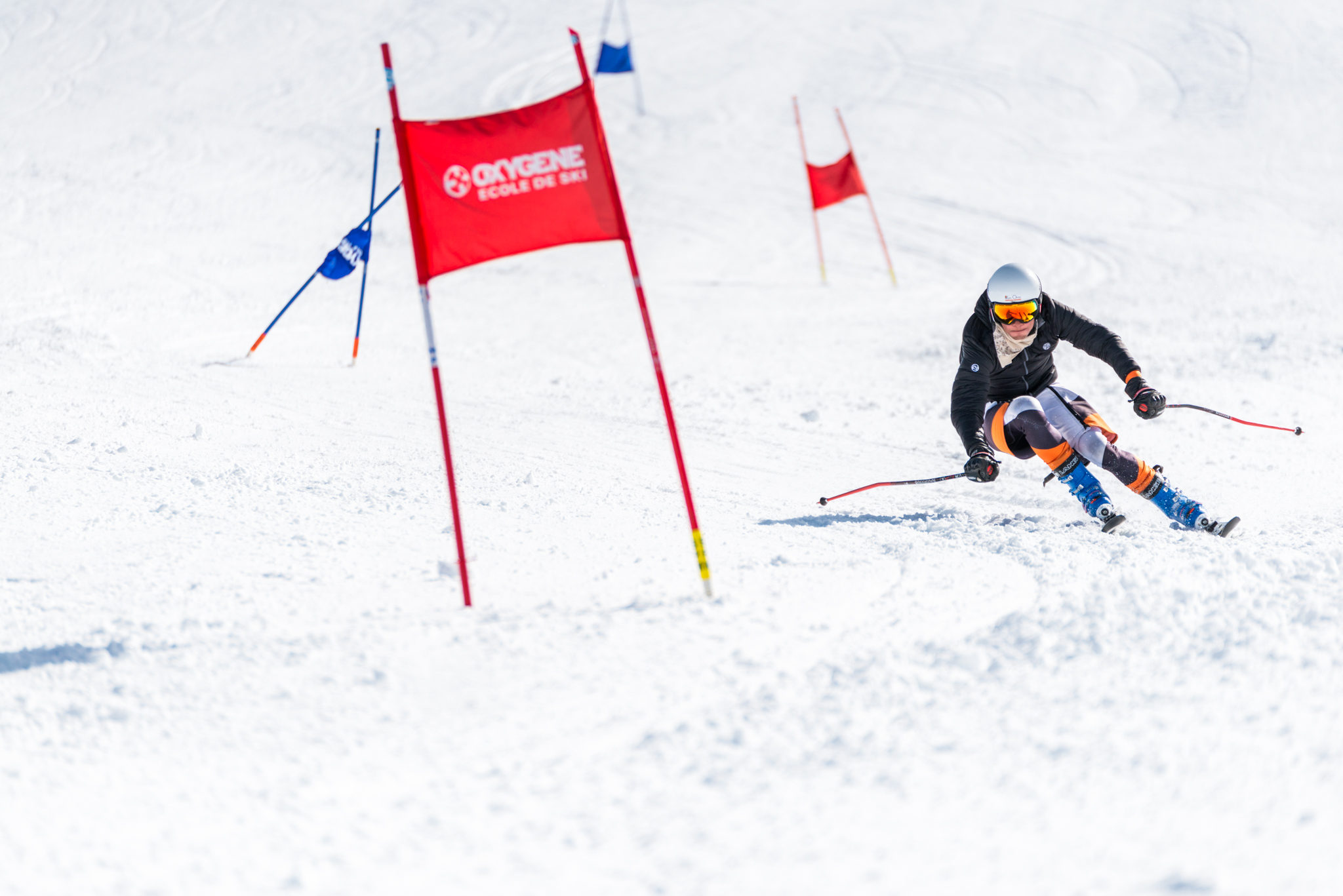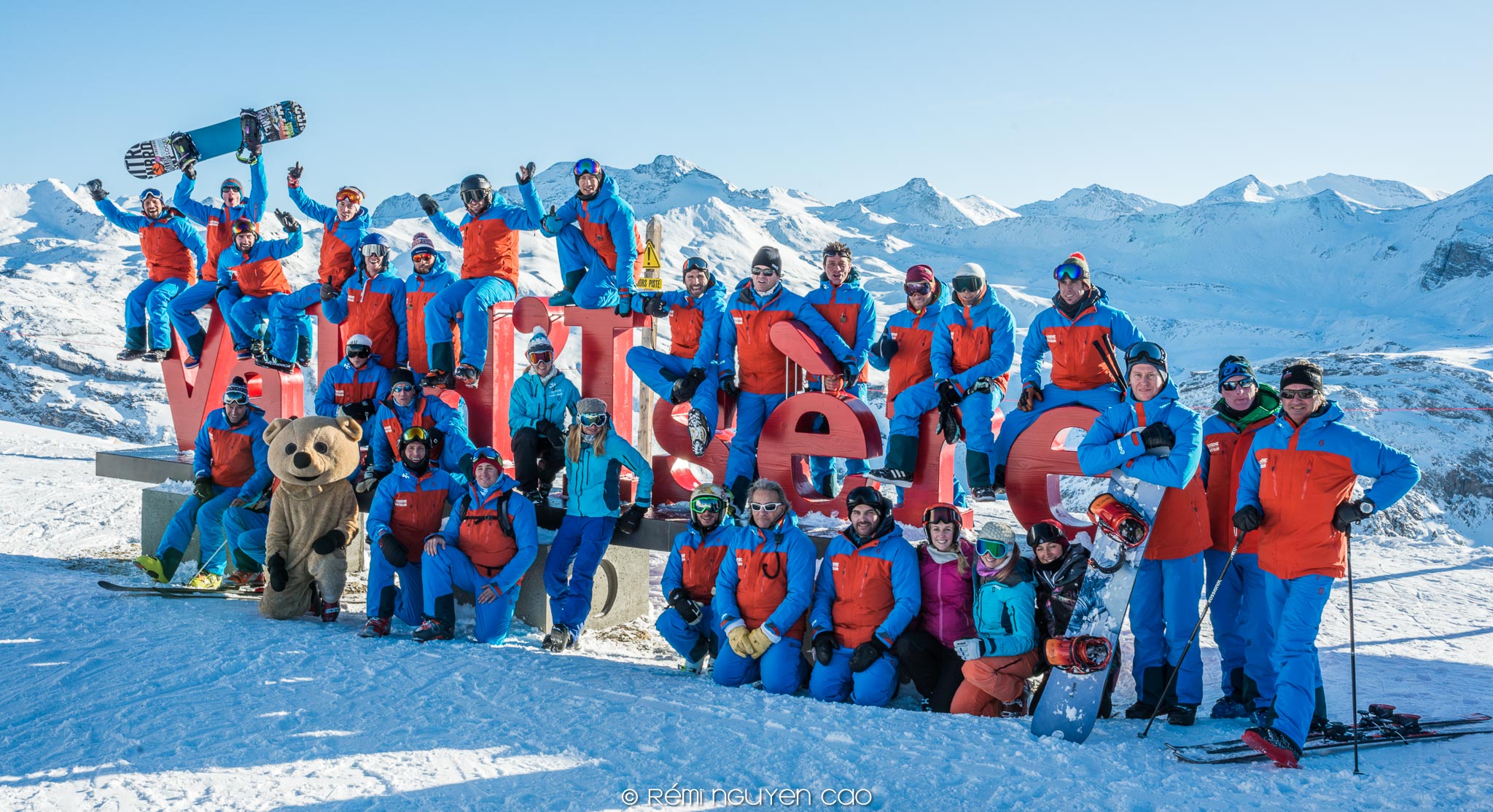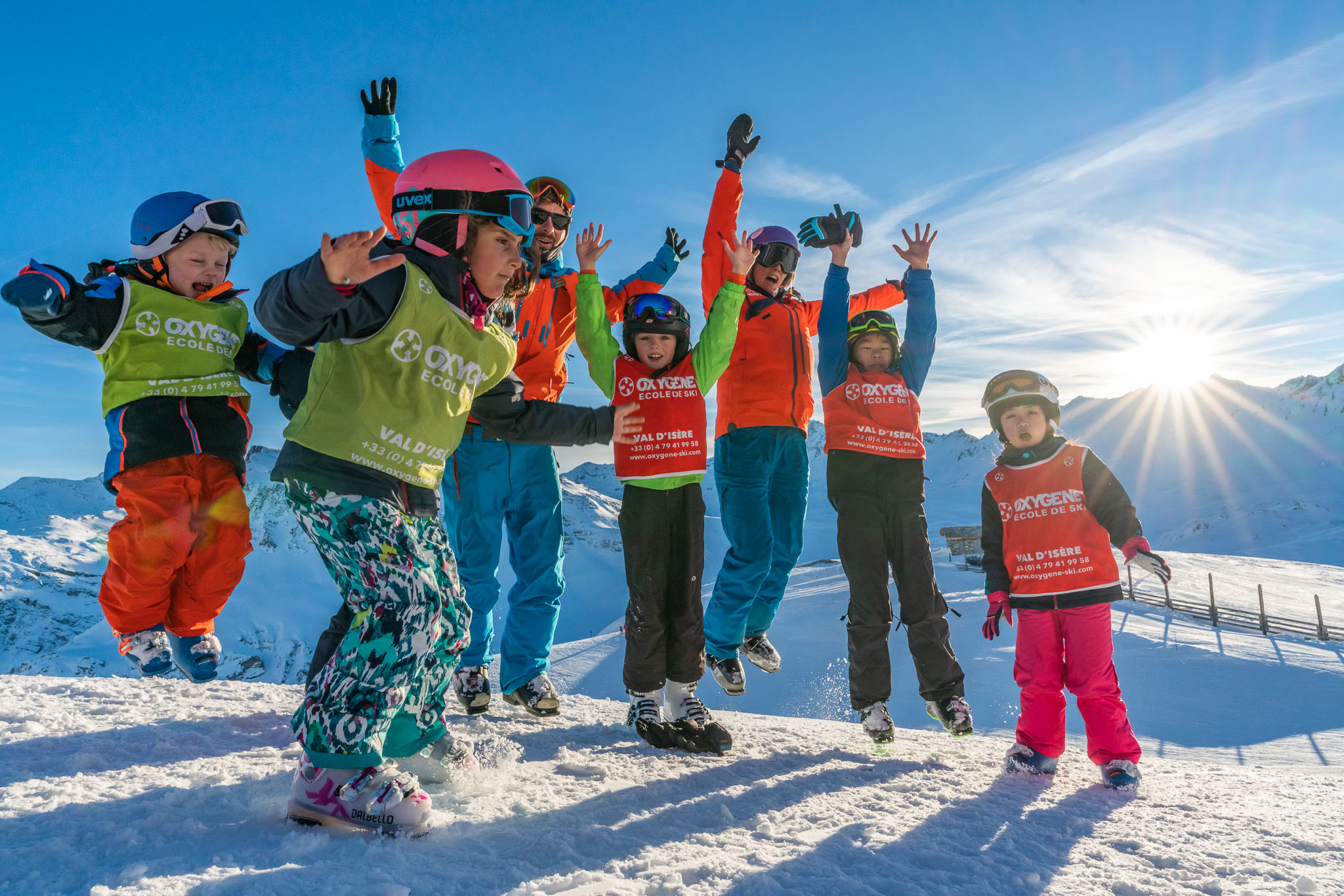How to teach as a British ski instructor in France?
Are you looking to become a fully qualified ski instructor? Maybe you’ve started your BASI training and are trying to work out how you can learn on the job. You might be wondering how to get the work experience you need to pass your exams. And how will you fund your way through your remaining exams? Perhaps you’re at the very beginning and wondering if you even have the right to teach in France. We have the answers to all of these questions and more. The good news is that yes, as a partly qualified, British ski instructor, there is a way you can teach in France and earn enough money to finance your way to being fully qualified. Let us take you through the process…

Oxygene ski instructors skiing with her students – 2019
How to become a trainee (stagiaire) ski instructor in France?
If you have started your BASI training and want to be able to teach in France you will need to pass your BASI 2 exam as well as the French Test Technique slalom exam set by ENSA (Ecole Nationale de Ski et d’Alpinisme / National School of Skiing & Mountaineering). They are the one and only governing body in France responsible for awarding the French Ski Instructor Diploma.
Test 1: BASI 2 or The Cycle Preparatoire (French equivalent)
The BASI 2 and the Cycle Preparatoire are both 2 week long courses. Their aim is to teach you the A-Z of teaching children and adults from beginner to level 2 skiers. It’s a great idea to get some experience by shadowing experienced instructors and helping out in a variety of ski lesson environments before doing this course. It will give you a better understanding of the reality of being a ski instructor. Note: You can do the French equivalent, the Cycle Preparatoire, but you must be fluent in French.
Test 2: The Test Technique
The Test Technique is a slalom race run in accordance with FIS rules. It is open to everyone over the age of 17 in possession of a doctor’s certificate confirming they are fit enough to compete. Each candidate has 2 runs on 2 different courses. Forerunners are used to set a base time. The pass rate is the base time +20% for women and the base time +18% for men. The base time of each course is different. If you pass on the first run you don’t do the second run. The bib numbers are selected randomly and the order is inverted on the second run. Each candidate is only allowed to take 2 Test Technique exams per season. Because of the race conditions, this exam is stressful and physically demanding. We recommend getting as much race experience as possible. The level required to pass this exam is around 100 FIS points or less.

Ski Academy Slalom Training
The Fast-track to Passing Your Test Technique: Oxygene Ski Academy
We may be stating the obvious but the Test Technique is technical. You will need to be in peak physical shape, spend hours training on the slalom slope with an experienced coaching team and be mentally prepared for the challenge. The Ski Academy provides all of this and more over a 13 week programme. Our dedicated coaching team uses a variety of training techniques including video feedback, one-to-one mentoring and race support to get you to the level required.
Congratulations, you’ve passed. Ready to start teaching?
Passed your Test Technique and BASI 2? You will be given a Livret de Formation, making you a trainee ski instructor authorised to teach in France. Now you need to find a ski school with a licensed ‘Centre de formation’ (training centre). At this time, the only ski schools registered as training centres are French (no British ski schools hold this status).
Choose Oxygene
Oxygene is a recognised training centre eligible to accept you as a trainee ski instructor to work as you continue to train towards becoming fully qualified. We have an international clientele and are actively looking to invest in and recruit new trainee instructors. With Oxygene you’ll benefit from the trainee #NoStress Pack which includes:
- in-resort accommodation paid for by Oxygene (valued at 2500€ per season)
- instructor uniform
- a full area lift pass
- a minimum of 250 hours paid teaching work throughout the season
- a great rate of pay (30€ per hour)
- free instructor training (including Eurotest preparation)
- free access to our workshop
This is a rare offer, that, at the time of writing, doesn’t exist in any other ski school in France.
So why is Oxygene offering such an amazing deal?
We know it is becoming more and more difficult for you, trainee instructors, to gain your qualification. This is due to mounting financial pressures and a lack of structure and support to prepare you for your exams. Our aim is to take the stress out of the financial side and provide a solid coaching environment so you can focus on passing your exams. And there’s something in it for us too. We’re looking to recruit more young, dynamic, internationally focused ski instructors into our teams across the Alps.

Val d’Isere instructors team
Completing your ski instructor qualification in France
If you have started on the BASI path, the best thing to do is to continue. If you complete your BASI diploma (level 3 and 4) and the Eurotest, you will be fully qualified to work in all European countries, including France. Many schools provide BASI courses throughout the world, even in France. The choice is yours.
What is the Eurotest?
The Eurotest is the exam you must pass to have the right to teach in France as a fully qualified ski instructor. It is part of the ISTD (BASI system). The Eurotest is a timed giant slalom test amongst the most technical of any test you’ll undertake during your diploma. This giant slalom lasts one minute and the opening skier (who sets the time you need to get within 10% of) are European Cup level skiers. Many ski instructors struggle and need more than one attempt to pass.
How long does it take to become a fully qualified ski instructor?
It is possible to become qualified in 4 years however on average most ski instructors achieve this within 5 or 6 years of starting their diploma. Thankfully, it is one of the (rare) professions where you can start to work before you are fully qualified. You can teach as a trainee even if you have started your ski instructor diploma through the British/BASI path, as long as you have the right exams in your pocket.

Skiing with Oxygene is fun!
When can I start training to be a ski instructor?
You can start training with BASI from age 16 (with a minimum of 16 weeks skiing experience under your belt). Once you are 17 years old you are eligible to take the Test Technique but you won’t be able to start teaching until you are 18.
Make your career with Oxygene
Newly qualified instructors can follow a career path at one of our 10 Oxygene ski schools in the French Alps. And there are many different paths you can take. In recent years, several of our schools have become renowned for their adaptive (disabled) ski programme providing sit-ski training to our instructors with a view to being able to make skiing accessible to all. This is just one path you could take. Throughout your career Oxygene will enrich your knowledge and experience. Every day we strive to be better. Safely passing on the pleasure of skiing to our students is the bedrock of being an Oxygene ski instructor. Happy skiing and good luck!
Any more questions? Read our article about Why become a ski instructor in France.


Niall Coghill
Hello my name is Niall and am considering a complete change in my life I’m a keen holiday skier with 20+ weeks of skiing behind me . I’m happiest in the mountains be that in the Alps or here in Ireland and was enquiring would it still be possible for me to become a ski instructor given that I’m 53 , I’m in good shape for my age as I’m a keen masters rower, I look forward to your reply
Kind regards Niall
Alison
Hi Niall,
can you contact directly moniteur@oxygene.ski ?
They can answer your questions.
Regards,
Oxygene team